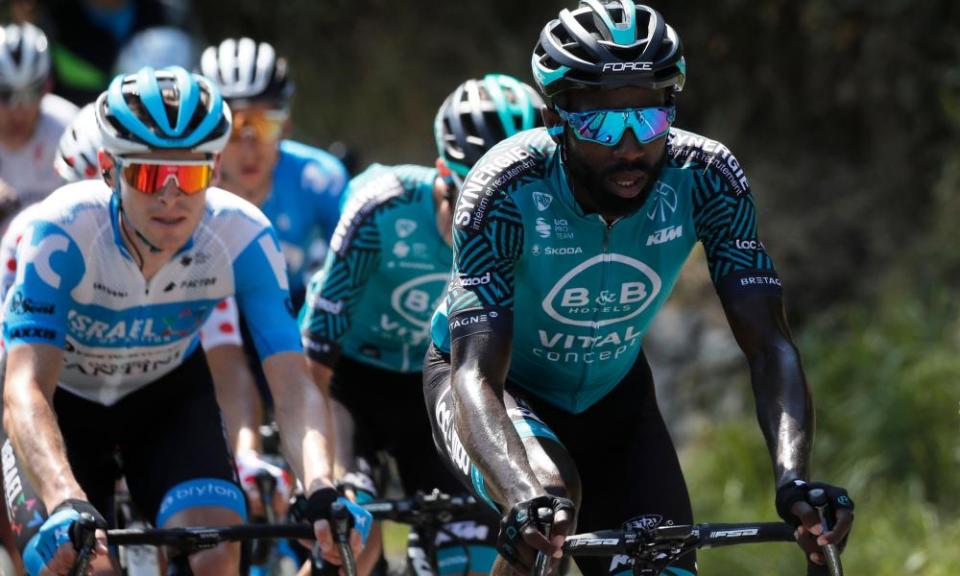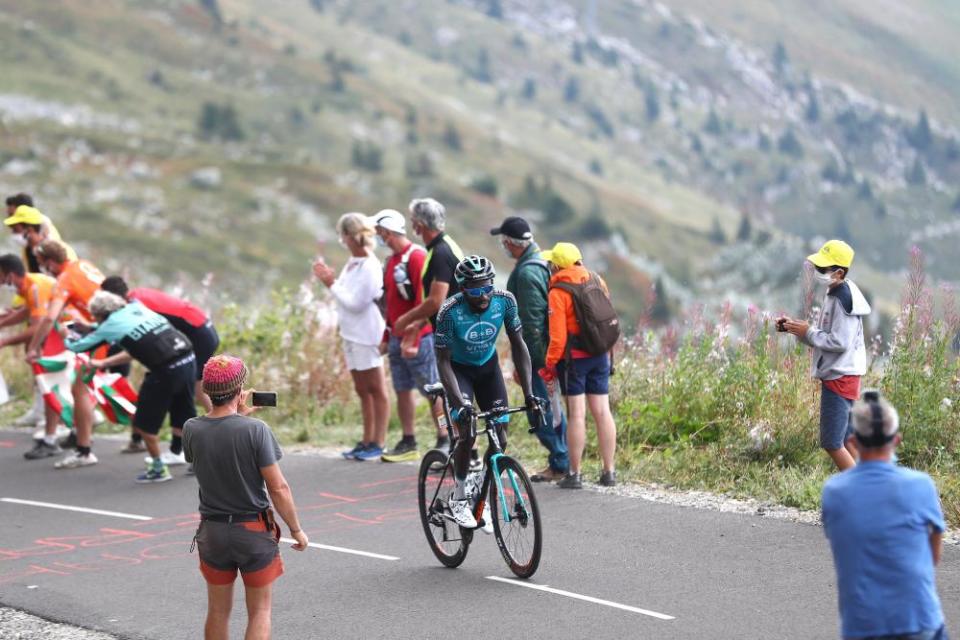Tour de France silent on Black Lives Matter, says cyclist Kevin Reza

Kevin Reza, the only black rider competing in this year’s Tour de France, has complained of a lack of support for the Black Lives Matter movement within professional cycling, particularly as this year’s race has been devoid of any endorsement of the anti-racism movement.
“I’ve been a professional for 10 years now and I haven’t seen a lot of solidarity in cycling,” Reza told cyclingnews.com when asked about his own experience of racist abuse. “That’s not a criticism – it’s just an observation. I don’t carry as much weight in world sport as Lewis Hamilton in Formula One or LeBron James in the NBA,” the French rider said, but added: “I feel really free and ready to fight and move forward.”
Reza, who rides for the B&B Hotels-Vital Concept team, was involved in an incident with Gianni Moscon, then with Team Sky and now of the Ineos Grenadiers team, in April 2017.
Related: Michal Kwiatkowski wins Tour stage to bring some relief to Ineos
Moscon was suspended by his team and sent on a “diversity awareness course”, but he was not disciplined by the sport’s world governing body, the UCI. “My conscience is clear,” the Italian said at the time. “I didn’t kill anybody and the accusations are not completely founded.”
Brian Cookson, the UCI president at the time of the incident, told the Guardian: “I do agree that in the current circumstances a case of racist abuse in any branch of the sport might attract a more severe penalty.”
Of the Tour’s silence on BLM, Cookson said: “It would be appropriate for at least some statement to be made given the matter has been raised by Kevin Reza. There are other ethnicities present [at the Tour], though. Perhaps minds have been focused on overcoming the pandemic, to the exclusion of any other issue.”
The Ineos Grenadiers manager, Dave Brailsford, struggled to explain why the BLM movement has not gained any traction in a sport that has athletes and sponsors from Europe, the Americas and Africa. “There’s no denying that there hasn’t been a sport-wide action, at all the races or the Tour,” he said, “but I wouldn’t read into that that teams and individuals aren’t motivated and don’t have strong feelings.”
As stablemates with the Ineos-sponsored Lewis Hamilton, Brailsford said his team had “a lot of discussions at Ineos sport, between ourselves, the F1 team, the Americas Cup team, and [the Ligue 1 head coach] Patrick Vieira at Nice,” adding: “We were all very connected to what Lewis was doing in F1.
“We all agree that racism can’t exist and we should be very much on the front foot. Maybe it’s a reflection of the lack of a single voice – there isn’t that one really strong body in cycling that controls everything.
“If Lewis wasn’t there, would F1 have reacted as it has? I think the honest answer is probably not. If cycling had somebody of Lewis’s profile and passion, maybe we’d have a greater impact. I’m not suggesting that people are ambivalent – they’re not – but we could do more, there’s no doubt about it.”

The American rider Peter Stetina, who until the end of last year was sponsored by the Trek-Segafredo team, now led by Richie Porte, supports both Hamilton’s stance and Reza’s growing outspokenness. “Cycling doesn’t currently have a black superstar who has the platform such as Hamilton or a Colin Kaepernick. I think it’s important to allow black voices to take the lead and for the rest of us to support them,” the 33-year-old Coloradan said.
“I do think there is a desire to do better and I know, from conversations with my sponsors, there is a concerted effort within the industry to identify talent in racially diverse populations. This will take time, however: riders will need to be brought through the pipeline because it is a pro sport and the rider, regardless of colour, will need to perform.”
Stetina added: “There is a culture within the World Tour to just stay quiet and get on with the task of pedalling. Many riders are trained and instructed by team managers or sponsors to shy away from all confrontation and focus on pedalling fast.”
However, the American now feels he can speak up. “If you look at other riders, outside the confines of a team model, many are using the freedoms of their platforms to promote change. I hope the teams decide to take a stand until the pipeline is fixed.”

